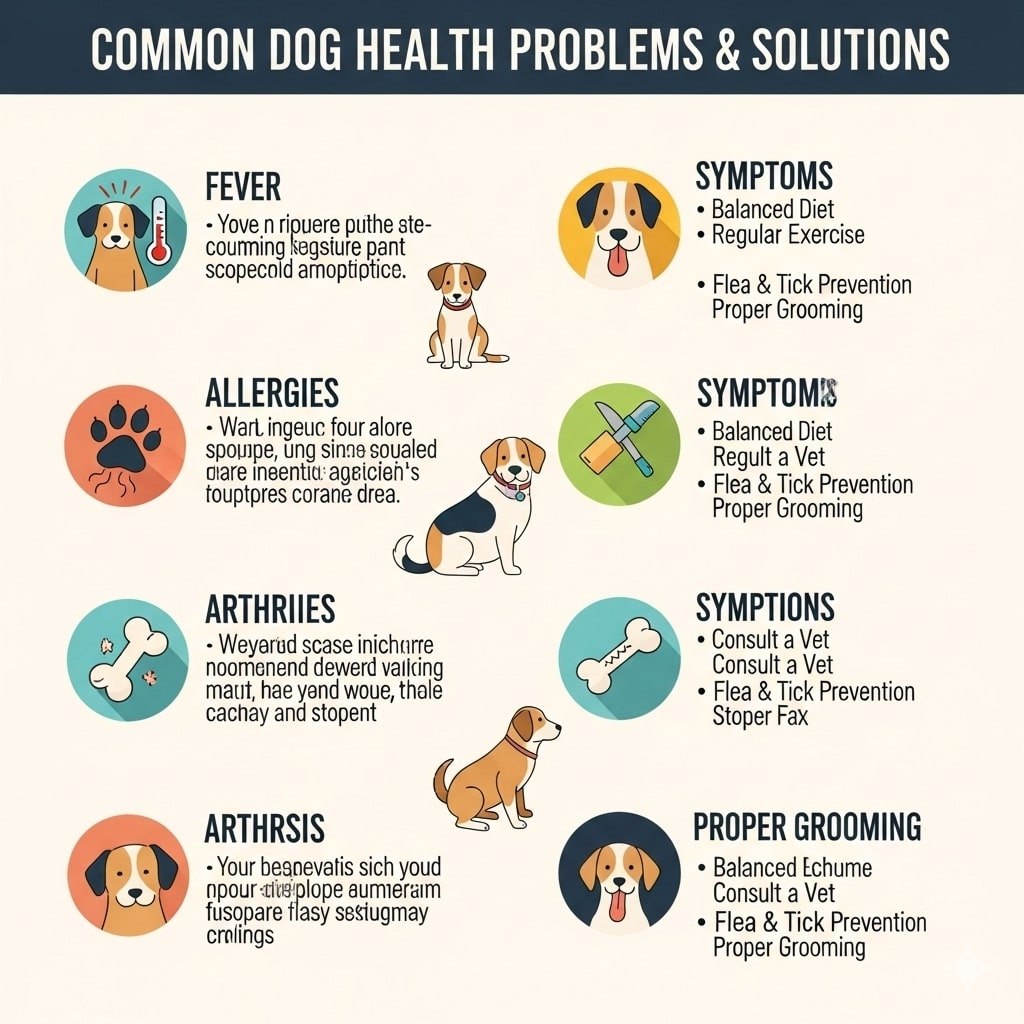Preventive Care Dog Health Problems: Vaccines, Regular Check-ups, and Healthy Habits
Dogs are more than just pets; they are cherished members of our families. As responsible pet owners, it’s essential to be aware of common health issues that can affect our canine companions and understand how to prevent, identify, and treat them. This guide provides an in-depth look at prevalent dog health problems and practical solutions to ensure your dog’s well-being. Every pet owers must be known about common dog health problems and how can slove them. So this article helps to pet owers about common Dog Health Problems and how solve them.
🐾 Table of Contents
- Introduction
- Common Dog Health Problems
- Skin and Coat Issues
- Ear Infections
- Digestive Problems
- Joint and Mobility Issues
- Dental Health Problems
- Parasites
- Heartworm Disease
- Obesity
- Allergies
- Cancer
- Breed-Specific Health Concerns
- Preventive Care and Wellness
- When to Consult a Veterinarian
- Conclusion
🐶 Introduction of Dog Health Problems
Dogs, like humans, can experience a variety of health issues throughout their lives. Early detection and appropriate treatment are crucial in managing these conditions effectively. Regular veterinary check-ups, a balanced diet, proper exercise, and good hygiene practices play a significant role in maintaining your dog’s health.

Discover More: Affordable Dog Grooming Tips for Busy US Pet Owners
🐕 Common Dog Health Problems
Skin and Coat Issues
Skin problems are among the most common health issues in dogs. Symptoms may include itching, redness, hair loss, and sores.
Causes:
- Allergies (food, environmental, flea)
- Parasites (fleas, mites, ticks)
- Infections (bacterial or fungal)
- Dry skin or hormonal imbalances
Solutions:
- Regular grooming and bathing with appropriate shampoos
- Use of flea and tick preventatives
- Consultation with a vet for potential allergies or infections
- Ensuring a balanced diet rich in essential fatty acids
Ear Infections
Dogs with floppy ears or those who swim frequently are prone to ear infections.
Symptoms:
- Scratching at ears
- Head shaking
- Odor or discharge from ears
- Redness or swelling inside the ear
Learn more: Best Dog Grooming Tips for Busy Pet Owners in the USA
Treatment:
- Regular ear cleaning with vet-recommended solutions
- Keeping ears dry and free from moisture
- Veterinary treatment for infections or underlying conditions
Digestive Problems
Digestive issues can manifest as vomiting, diarrhea, or changes in appetite.
Common Causes:
- Dietary indiscretion
- Food allergies or intolerances
- Infections or parasites
- Stress or sudden diet changes
Management:
- Gradual introduction of new foods
- Avoidance of table scraps and human foods
- Regular deworming and parasite control
- Veterinary consultation for persistent symptoms
Source: PetMD – Diarrhea in Dogs
Joint and Mobility Issues
Arthritis and hip dysplasia are common in older dogs and certain breeds.
Signs:
- Limping or stiffness
- Difficulty rising or jumping
- Lethargy or reluctance to exercise
Care Tips:
- Weight management to reduce joint stress
- Joint supplements containing glucosamine and chondroitin
- Regular, moderate exercise
- Veterinary-prescribed pain relief or anti-inflammatory medications
Dental Health Problems
Dental issues can lead to more severe health problems if left untreated.
Symptoms:
- Bad breath
- Red or swollen gums
- Difficulty eating
- Loose or missing teeth
Prevention and Treatment:
- Regular tooth brushing with dog-specific toothpaste
- Dental chews and toys
- Professional dental cleanings by a veterinarian
- Regular dental check-ups
Parasites
Fleas, ticks, and intestinal worms are common parasites that affect dogs.
Prevention:
- Monthly flea and tick preventatives
- Regular deworming treatments
- Regular checks for signs of parasites
- Keeping the living environment clean
Heartworm Disease
Heartworm disease is a serious and potentially fatal condition caused by parasitic worms living in the heart and lungs.
Transmission:
- Spread through mosquito bites
Prevention:
- Monthly heartworm preventatives
- Regular testing as recommended by a veterinarian
Obesity
Obesity is a growing concern and can lead to various health issues.
Risks:
- Increased risk of diabetes, joint problems, and heart disease
Management:
- Portion control and feeding a balanced diet
- Regular exercise tailored to the dog’s age and breed
- Regular weight monitoring and veterinary advice
Allergies
Dogs can suffer from allergies to food, environmental factors, or flea bites.
Symptoms:
- Itchy skin, ear infections, gastrointestinal upset
- Sneezing or watery eyes
Management:
- Identifying and avoiding allergens
- Medications as prescribed by a veterinarian
- Special diets for food allergies
Cancer
Cancer can affect dogs of all ages and breeds.
Signs:
- Unexplained weight loss
- Lumps or swelling
- Changes in appetite or behavior
Action:
- Regular veterinary check-ups
- Prompt attention to unusual symptoms
- Treatment options vary depending on the type and stage of cancer
🐩 Breed-Specific Health Concerns
Certain breeds are predisposed to specific health problems due to genetic factors.
- Bulldogs, Pugs, and French Bulldogs: Prone to brachycephalic syndrome, leading to breathing difficulties (The Spruce Pets).
- Golden Retrievers and Labrador Retrievers: Susceptible to hip dysplasia and certain cancers (WebMD).
- Cavalier King Charles Spaniels: At risk for heart issues and syringomyelia (The Guardian).
- Dachshunds: Prone to intervertebral disc disease due to their long backs.
Understanding breed-specific risks can help in early detection and prevention.
🩺 Preventive Care and Wellness of Dog Health Problems
Preventive care is vital in maintaining your dog’s health and preventing many common diseases.
Key Components:
- Regular Veterinary Check-ups: Annual or semi-annual visits for health assessments.
- Vaccinations: Keeping up-to-date with core and non-core vaccines.
- Parasite Control: Regular treatments for fleas, ticks, and worms.
- Dental Care: Regular brushing and professional cleanings.
- Nutrition: Providing a balanced diet suitable for the dog’s age, size, and health status.
- Exercise: Regular physical activity to maintain a healthy weight and muscle tone.
🐾 When to Consult a Veterinarian
It’s essential to consult a veterinarian when:
- Your dog exhibits persistent or severe symptoms.
- There are sudden changes in behavior, appetite, or weight.
- You notice lumps, swelling, or unusual growths.
- Your dog has difficulty breathing, vomiting, or diarrhea.
- There are signs of pain or discomfort.
Early veterinary intervention can lead to better outcomes and a higher quality of life for your dog.
🐕 Conclusion
Being proactive in your dog’s health care can prevent many common health problems. Regular veterinary visits, a balanced diet, proper exercise, and good hygiene practices are fundamental in ensuring your dog’s well-being. By staying informed and attentive, you can provide a happy and healthy life for your canine companion.
If you have specific concerns or need personalized advice, consult your veterinarian, who can provide guidance tailored to your dog’s individual needs.
Disclaimer:
The information provided in this article is for educational and informational purposes only. It is not intended to replace professional veterinary advice, diagnosis, or treatment. Always consult your veterinarian regarding any health concerns or before starting any new treatments for your dog. The author and website are not responsible for any actions taken based on this content.
